Healthcare Report: Impact of Parents on Child Eating Behavior, 2019
VerifiedAdded on 2023/01/18
|10
|3506
|39
Report
AI Summary
This report delves into the critical influence of parents on the eating behavior of preschool-aged children, emphasizing the importance of healthy eating habits. The study highlights the connection between parental actions, feeding practices, and the development of a child's dietary patterns. It explores the impact of parental control methods, such as restriction and pressure, on a child's food choices and overall well-being. The report references the 'Theory of Planned Behavior' to understand the factors that shape parental actions and suggests practical strategies for parents to promote nutritious eating habits, including setting a positive example, providing guidance, and creating a supportive family environment. It also discusses the strengths of a program aimed at educating parents about their role in child nutrition, including the potential to address malnutrition and promote lifelong healthy eating behaviors, while acknowledging the challenges of changing established habits. The report underscores the need for parental awareness and education to foster a healthy relationship with food and prevent future health issues.
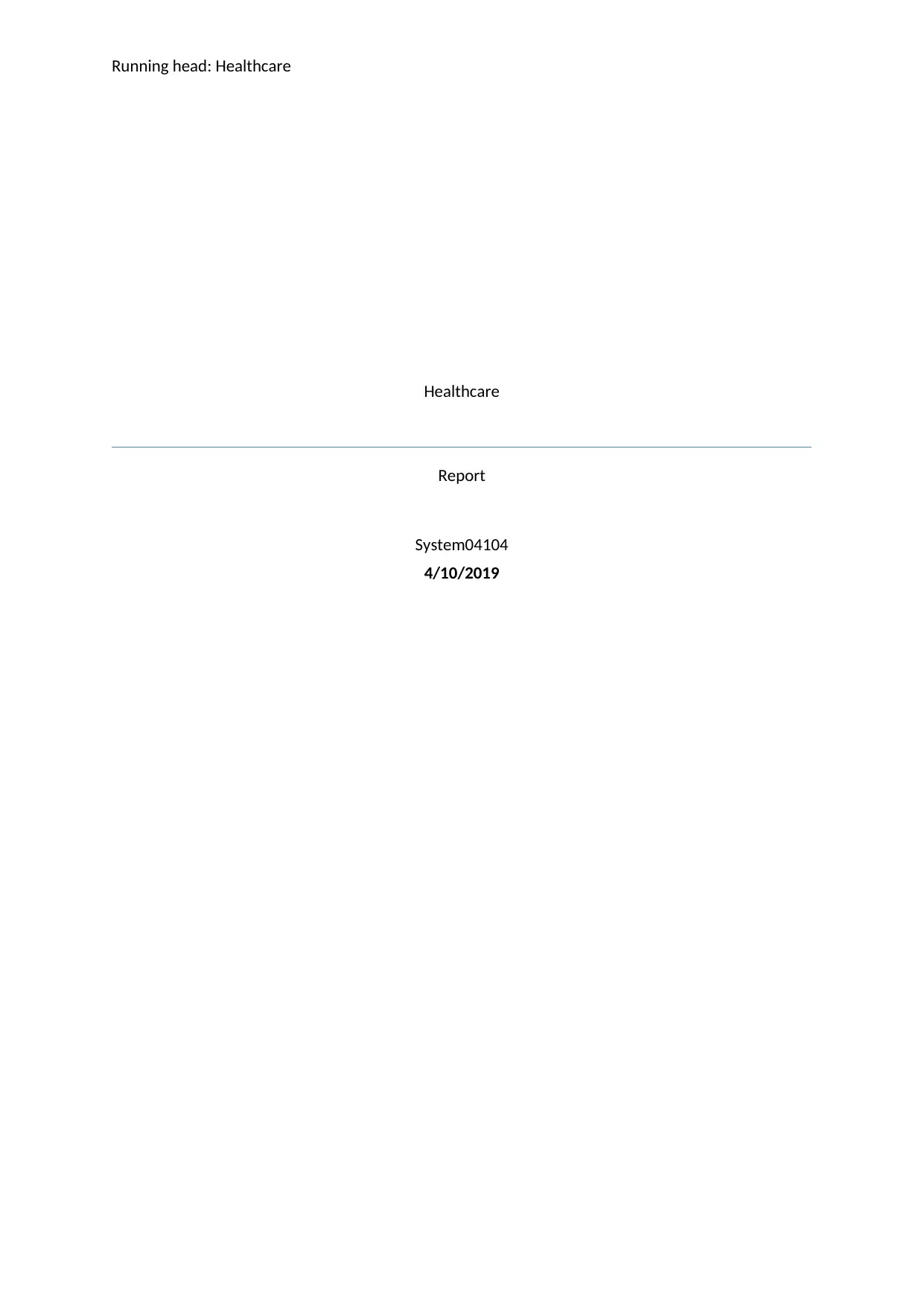
Running head: Healthcare
Healthcare
Report
System04104
4/10/2019
Healthcare
Report
System04104
4/10/2019
Paraphrase This Document
Need a fresh take? Get an instant paraphrase of this document with our AI Paraphraser
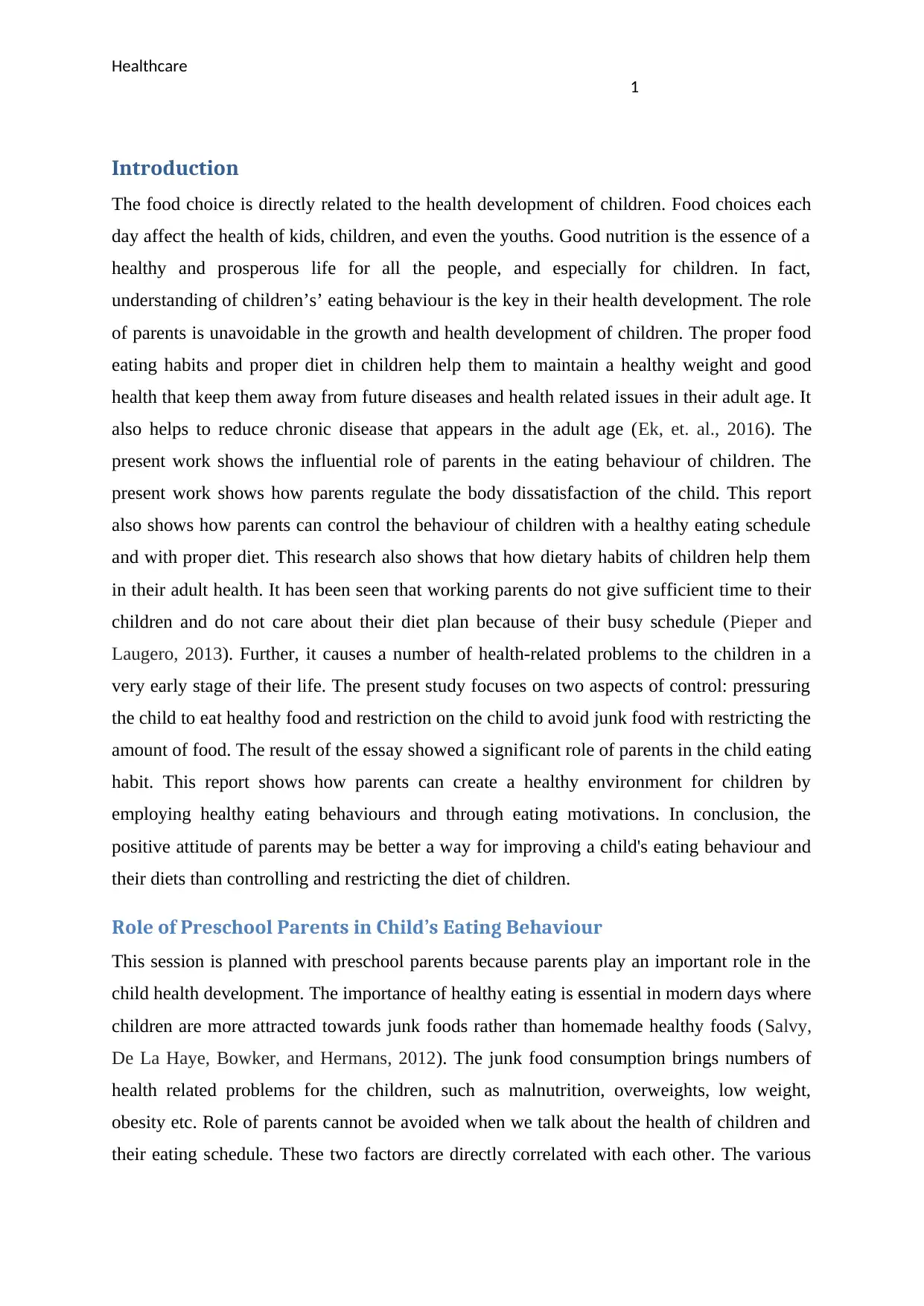
Healthcare
1
Introduction
The food choice is directly related to the health development of children. Food choices each
day affect the health of kids, children, and even the youths. Good nutrition is the essence of a
healthy and prosperous life for all the people, and especially for children. In fact,
understanding of children’s’ eating behaviour is the key in their health development. The role
of parents is unavoidable in the growth and health development of children. The proper food
eating habits and proper diet in children help them to maintain a healthy weight and good
health that keep them away from future diseases and health related issues in their adult age. It
also helps to reduce chronic disease that appears in the adult age (Ek, et. al., 2016). The
present work shows the influential role of parents in the eating behaviour of children. The
present work shows how parents regulate the body dissatisfaction of the child. This report
also shows how parents can control the behaviour of children with a healthy eating schedule
and with proper diet. This research also shows that how dietary habits of children help them
in their adult health. It has been seen that working parents do not give sufficient time to their
children and do not care about their diet plan because of their busy schedule (Pieper and
Laugero, 2013). Further, it causes a number of health-related problems to the children in a
very early stage of their life. The present study focuses on two aspects of control: pressuring
the child to eat healthy food and restriction on the child to avoid junk food with restricting the
amount of food. The result of the essay showed a significant role of parents in the child eating
habit. This report shows how parents can create a healthy environment for children by
employing healthy eating behaviours and through eating motivations. In conclusion, the
positive attitude of parents may be better a way for improving a child's eating behaviour and
their diets than controlling and restricting the diet of children.
Role of Preschool Parents in Child’s Eating Behaviour
This session is planned with preschool parents because parents play an important role in the
child health development. The importance of healthy eating is essential in modern days where
children are more attracted towards junk foods rather than homemade healthy foods (Salvy,
De La Haye, Bowker, and Hermans, 2012). The junk food consumption brings numbers of
health related problems for the children, such as malnutrition, overweights, low weight,
obesity etc. Role of parents cannot be avoided when we talk about the health of children and
their eating schedule. These two factors are directly correlated with each other. The various
1
Introduction
The food choice is directly related to the health development of children. Food choices each
day affect the health of kids, children, and even the youths. Good nutrition is the essence of a
healthy and prosperous life for all the people, and especially for children. In fact,
understanding of children’s’ eating behaviour is the key in their health development. The role
of parents is unavoidable in the growth and health development of children. The proper food
eating habits and proper diet in children help them to maintain a healthy weight and good
health that keep them away from future diseases and health related issues in their adult age. It
also helps to reduce chronic disease that appears in the adult age (Ek, et. al., 2016). The
present work shows the influential role of parents in the eating behaviour of children. The
present work shows how parents regulate the body dissatisfaction of the child. This report
also shows how parents can control the behaviour of children with a healthy eating schedule
and with proper diet. This research also shows that how dietary habits of children help them
in their adult health. It has been seen that working parents do not give sufficient time to their
children and do not care about their diet plan because of their busy schedule (Pieper and
Laugero, 2013). Further, it causes a number of health-related problems to the children in a
very early stage of their life. The present study focuses on two aspects of control: pressuring
the child to eat healthy food and restriction on the child to avoid junk food with restricting the
amount of food. The result of the essay showed a significant role of parents in the child eating
habit. This report shows how parents can create a healthy environment for children by
employing healthy eating behaviours and through eating motivations. In conclusion, the
positive attitude of parents may be better a way for improving a child's eating behaviour and
their diets than controlling and restricting the diet of children.
Role of Preschool Parents in Child’s Eating Behaviour
This session is planned with preschool parents because parents play an important role in the
child health development. The importance of healthy eating is essential in modern days where
children are more attracted towards junk foods rather than homemade healthy foods (Salvy,
De La Haye, Bowker, and Hermans, 2012). The junk food consumption brings numbers of
health related problems for the children, such as malnutrition, overweights, low weight,
obesity etc. Role of parents cannot be avoided when we talk about the health of children and
their eating schedule. These two factors are directly correlated with each other. The various
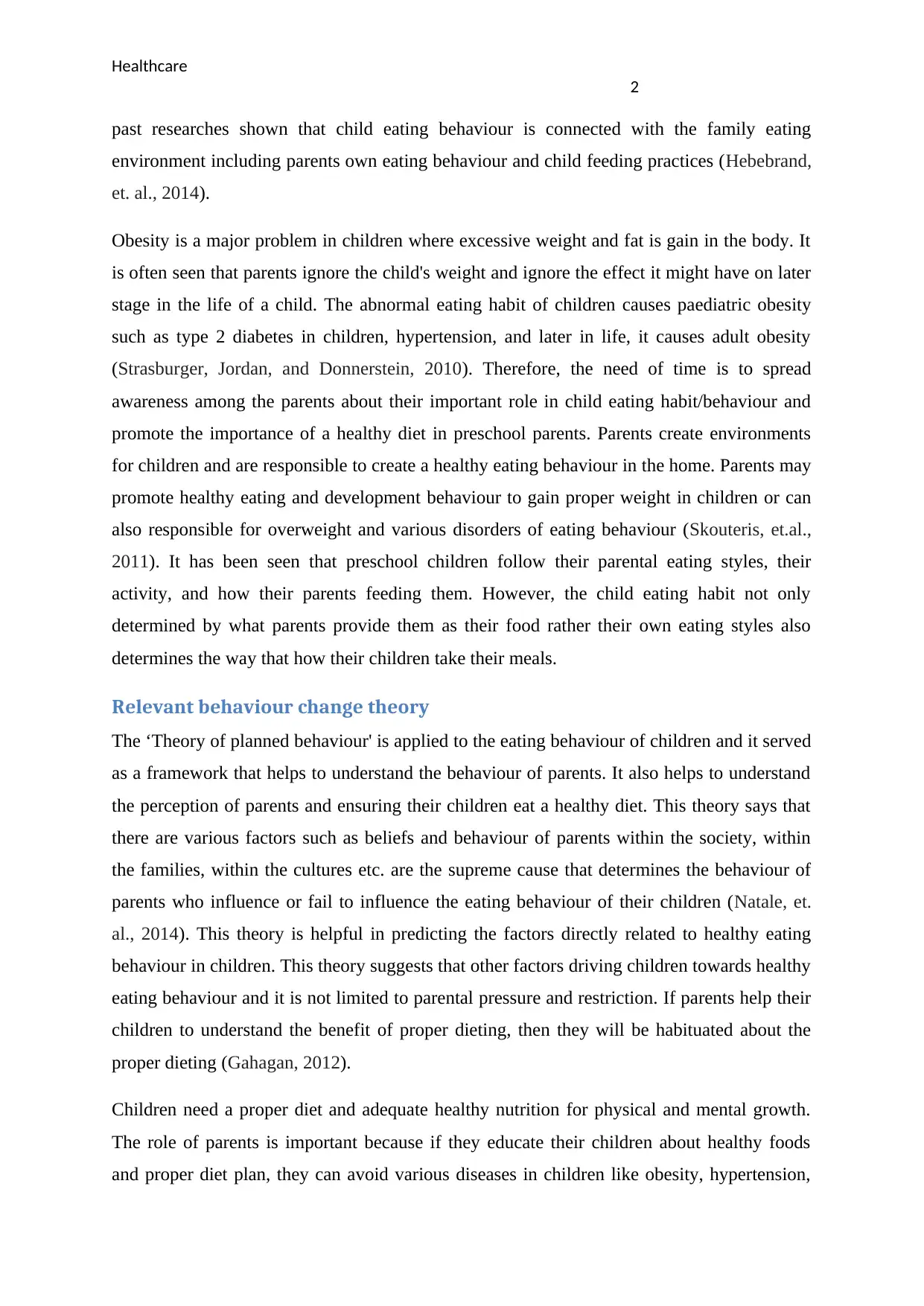
Healthcare
2
past researches shown that child eating behaviour is connected with the family eating
environment including parents own eating behaviour and child feeding practices (Hebebrand,
et. al., 2014).
Obesity is a major problem in children where excessive weight and fat is gain in the body. It
is often seen that parents ignore the child's weight and ignore the effect it might have on later
stage in the life of a child. The abnormal eating habit of children causes paediatric obesity
such as type 2 diabetes in children, hypertension, and later in life, it causes adult obesity
(Strasburger, Jordan, and Donnerstein, 2010). Therefore, the need of time is to spread
awareness among the parents about their important role in child eating habit/behaviour and
promote the importance of a healthy diet in preschool parents. Parents create environments
for children and are responsible to create a healthy eating behaviour in the home. Parents may
promote healthy eating and development behaviour to gain proper weight in children or can
also responsible for overweight and various disorders of eating behaviour (Skouteris, et.al.,
2011). It has been seen that preschool children follow their parental eating styles, their
activity, and how their parents feeding them. However, the child eating habit not only
determined by what parents provide them as their food rather their own eating styles also
determines the way that how their children take their meals.
Relevant behaviour change theory
The ‘Theory of planned behaviour' is applied to the eating behaviour of children and it served
as a framework that helps to understand the behaviour of parents. It also helps to understand
the perception of parents and ensuring their children eat a healthy diet. This theory says that
there are various factors such as beliefs and behaviour of parents within the society, within
the families, within the cultures etc. are the supreme cause that determines the behaviour of
parents who influence or fail to influence the eating behaviour of their children (Natale, et.
al., 2014). This theory is helpful in predicting the factors directly related to healthy eating
behaviour in children. This theory suggests that other factors driving children towards healthy
eating behaviour and it is not limited to parental pressure and restriction. If parents help their
children to understand the benefit of proper dieting, then they will be habituated about the
proper dieting (Gahagan, 2012).
Children need a proper diet and adequate healthy nutrition for physical and mental growth.
The role of parents is important because if they educate their children about healthy foods
and proper diet plan, they can avoid various diseases in children like obesity, hypertension,
2
past researches shown that child eating behaviour is connected with the family eating
environment including parents own eating behaviour and child feeding practices (Hebebrand,
et. al., 2014).
Obesity is a major problem in children where excessive weight and fat is gain in the body. It
is often seen that parents ignore the child's weight and ignore the effect it might have on later
stage in the life of a child. The abnormal eating habit of children causes paediatric obesity
such as type 2 diabetes in children, hypertension, and later in life, it causes adult obesity
(Strasburger, Jordan, and Donnerstein, 2010). Therefore, the need of time is to spread
awareness among the parents about their important role in child eating habit/behaviour and
promote the importance of a healthy diet in preschool parents. Parents create environments
for children and are responsible to create a healthy eating behaviour in the home. Parents may
promote healthy eating and development behaviour to gain proper weight in children or can
also responsible for overweight and various disorders of eating behaviour (Skouteris, et.al.,
2011). It has been seen that preschool children follow their parental eating styles, their
activity, and how their parents feeding them. However, the child eating habit not only
determined by what parents provide them as their food rather their own eating styles also
determines the way that how their children take their meals.
Relevant behaviour change theory
The ‘Theory of planned behaviour' is applied to the eating behaviour of children and it served
as a framework that helps to understand the behaviour of parents. It also helps to understand
the perception of parents and ensuring their children eat a healthy diet. This theory says that
there are various factors such as beliefs and behaviour of parents within the society, within
the families, within the cultures etc. are the supreme cause that determines the behaviour of
parents who influence or fail to influence the eating behaviour of their children (Natale, et.
al., 2014). This theory is helpful in predicting the factors directly related to healthy eating
behaviour in children. This theory suggests that other factors driving children towards healthy
eating behaviour and it is not limited to parental pressure and restriction. If parents help their
children to understand the benefit of proper dieting, then they will be habituated about the
proper dieting (Gahagan, 2012).
Children need a proper diet and adequate healthy nutrition for physical and mental growth.
The role of parents is important because if they educate their children about healthy foods
and proper diet plan, they can avoid various diseases in children like obesity, hypertension,
⊘ This is a preview!⊘
Do you want full access?
Subscribe today to unlock all pages.

Trusted by 1+ million students worldwide
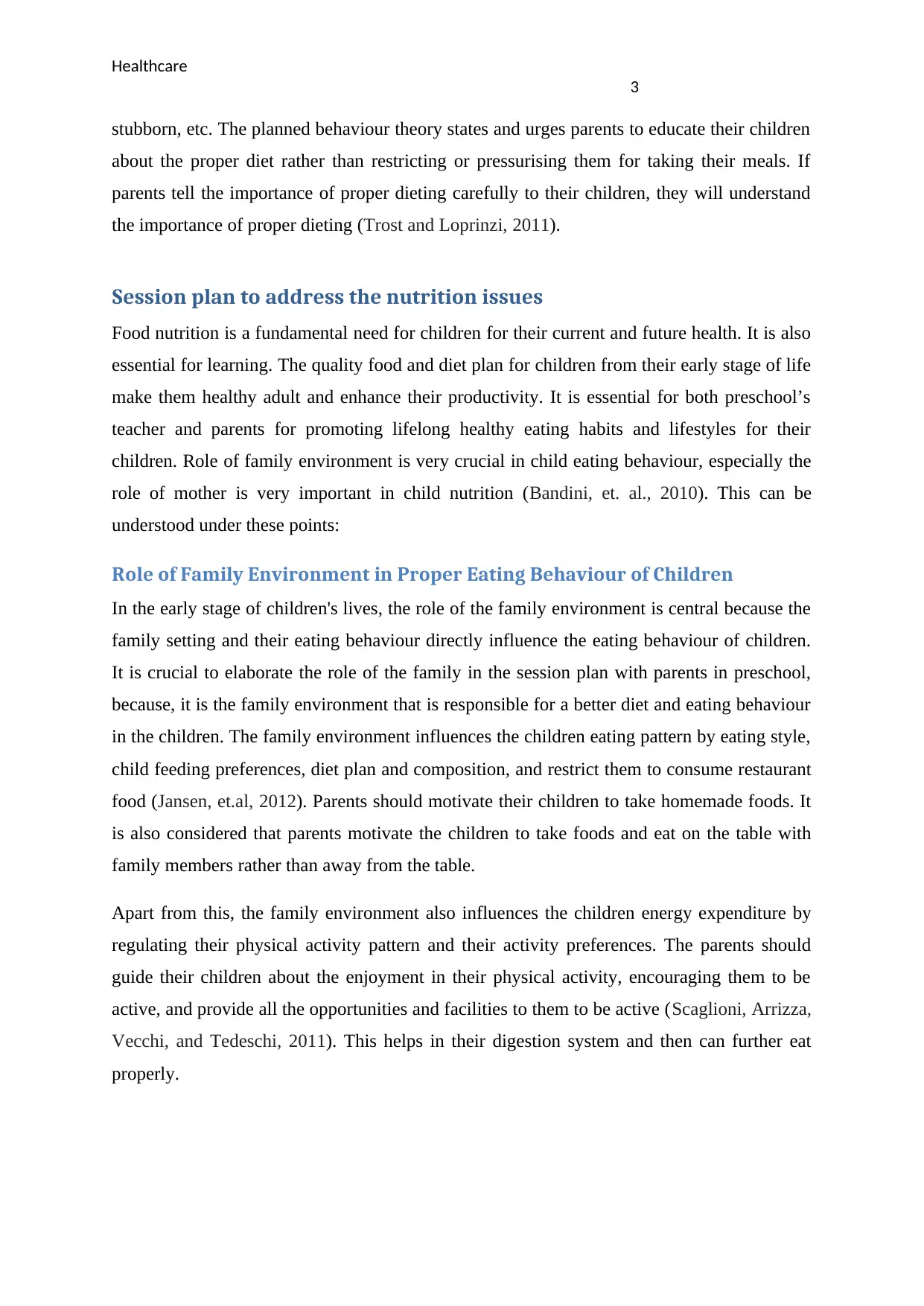
Healthcare
3
stubborn, etc. The planned behaviour theory states and urges parents to educate their children
about the proper diet rather than restricting or pressurising them for taking their meals. If
parents tell the importance of proper dieting carefully to their children, they will understand
the importance of proper dieting (Trost and Loprinzi, 2011).
Session plan to address the nutrition issues
Food nutrition is a fundamental need for children for their current and future health. It is also
essential for learning. The quality food and diet plan for children from their early stage of life
make them healthy adult and enhance their productivity. It is essential for both preschool’s
teacher and parents for promoting lifelong healthy eating habits and lifestyles for their
children. Role of family environment is very crucial in child eating behaviour, especially the
role of mother is very important in child nutrition (Bandini, et. al., 2010). This can be
understood under these points:
Role of Family Environment in Proper Eating Behaviour of Children
In the early stage of children's lives, the role of the family environment is central because the
family setting and their eating behaviour directly influence the eating behaviour of children.
It is crucial to elaborate the role of the family in the session plan with parents in preschool,
because, it is the family environment that is responsible for a better diet and eating behaviour
in the children. The family environment influences the children eating pattern by eating style,
child feeding preferences, diet plan and composition, and restrict them to consume restaurant
food (Jansen, et.al, 2012). Parents should motivate their children to take homemade foods. It
is also considered that parents motivate the children to take foods and eat on the table with
family members rather than away from the table.
Apart from this, the family environment also influences the children energy expenditure by
regulating their physical activity pattern and their activity preferences. The parents should
guide their children about the enjoyment in their physical activity, encouraging them to be
active, and provide all the opportunities and facilities to them to be active (Scaglioni, Arrizza,
Vecchi, and Tedeschi, 2011). This helps in their digestion system and then can further eat
properly.
3
stubborn, etc. The planned behaviour theory states and urges parents to educate their children
about the proper diet rather than restricting or pressurising them for taking their meals. If
parents tell the importance of proper dieting carefully to their children, they will understand
the importance of proper dieting (Trost and Loprinzi, 2011).
Session plan to address the nutrition issues
Food nutrition is a fundamental need for children for their current and future health. It is also
essential for learning. The quality food and diet plan for children from their early stage of life
make them healthy adult and enhance their productivity. It is essential for both preschool’s
teacher and parents for promoting lifelong healthy eating habits and lifestyles for their
children. Role of family environment is very crucial in child eating behaviour, especially the
role of mother is very important in child nutrition (Bandini, et. al., 2010). This can be
understood under these points:
Role of Family Environment in Proper Eating Behaviour of Children
In the early stage of children's lives, the role of the family environment is central because the
family setting and their eating behaviour directly influence the eating behaviour of children.
It is crucial to elaborate the role of the family in the session plan with parents in preschool,
because, it is the family environment that is responsible for a better diet and eating behaviour
in the children. The family environment influences the children eating pattern by eating style,
child feeding preferences, diet plan and composition, and restrict them to consume restaurant
food (Jansen, et.al, 2012). Parents should motivate their children to take homemade foods. It
is also considered that parents motivate the children to take foods and eat on the table with
family members rather than away from the table.
Apart from this, the family environment also influences the children energy expenditure by
regulating their physical activity pattern and their activity preferences. The parents should
guide their children about the enjoyment in their physical activity, encouraging them to be
active, and provide all the opportunities and facilities to them to be active (Scaglioni, Arrizza,
Vecchi, and Tedeschi, 2011). This helps in their digestion system and then can further eat
properly.
Paraphrase This Document
Need a fresh take? Get an instant paraphrase of this document with our AI Paraphraser
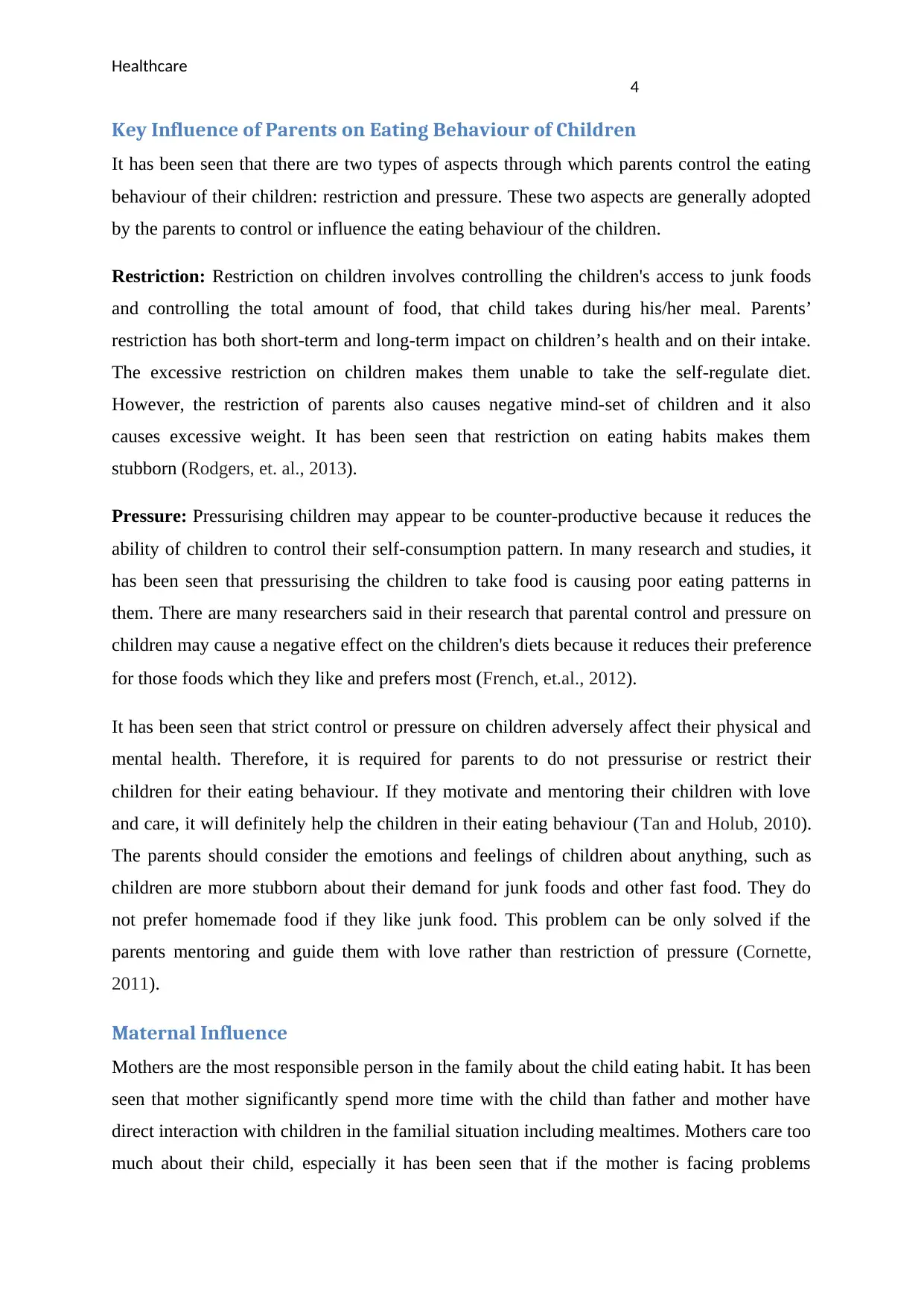
Healthcare
4
Key Influence of Parents on Eating Behaviour of Children
It has been seen that there are two types of aspects through which parents control the eating
behaviour of their children: restriction and pressure. These two aspects are generally adopted
by the parents to control or influence the eating behaviour of the children.
Restriction: Restriction on children involves controlling the children's access to junk foods
and controlling the total amount of food, that child takes during his/her meal. Parents’
restriction has both short-term and long-term impact on children’s health and on their intake.
The excessive restriction on children makes them unable to take the self-regulate diet.
However, the restriction of parents also causes negative mind-set of children and it also
causes excessive weight. It has been seen that restriction on eating habits makes them
stubborn (Rodgers, et. al., 2013).
Pressure: Pressurising children may appear to be counter-productive because it reduces the
ability of children to control their self-consumption pattern. In many research and studies, it
has been seen that pressurising the children to take food is causing poor eating patterns in
them. There are many researchers said in their research that parental control and pressure on
children may cause a negative effect on the children's diets because it reduces their preference
for those foods which they like and prefers most (French, et.al., 2012).
It has been seen that strict control or pressure on children adversely affect their physical and
mental health. Therefore, it is required for parents to do not pressurise or restrict their
children for their eating behaviour. If they motivate and mentoring their children with love
and care, it will definitely help the children in their eating behaviour (Tan and Holub, 2010).
The parents should consider the emotions and feelings of children about anything, such as
children are more stubborn about their demand for junk foods and other fast food. They do
not prefer homemade food if they like junk food. This problem can be only solved if the
parents mentoring and guide them with love rather than restriction of pressure (Cornette,
2011).
Maternal Influence
Mothers are the most responsible person in the family about the child eating habit. It has been
seen that mother significantly spend more time with the child than father and mother have
direct interaction with children in the familial situation including mealtimes. Mothers care too
much about their child, especially it has been seen that if the mother is facing problems
4
Key Influence of Parents on Eating Behaviour of Children
It has been seen that there are two types of aspects through which parents control the eating
behaviour of their children: restriction and pressure. These two aspects are generally adopted
by the parents to control or influence the eating behaviour of the children.
Restriction: Restriction on children involves controlling the children's access to junk foods
and controlling the total amount of food, that child takes during his/her meal. Parents’
restriction has both short-term and long-term impact on children’s health and on their intake.
The excessive restriction on children makes them unable to take the self-regulate diet.
However, the restriction of parents also causes negative mind-set of children and it also
causes excessive weight. It has been seen that restriction on eating habits makes them
stubborn (Rodgers, et. al., 2013).
Pressure: Pressurising children may appear to be counter-productive because it reduces the
ability of children to control their self-consumption pattern. In many research and studies, it
has been seen that pressurising the children to take food is causing poor eating patterns in
them. There are many researchers said in their research that parental control and pressure on
children may cause a negative effect on the children's diets because it reduces their preference
for those foods which they like and prefers most (French, et.al., 2012).
It has been seen that strict control or pressure on children adversely affect their physical and
mental health. Therefore, it is required for parents to do not pressurise or restrict their
children for their eating behaviour. If they motivate and mentoring their children with love
and care, it will definitely help the children in their eating behaviour (Tan and Holub, 2010).
The parents should consider the emotions and feelings of children about anything, such as
children are more stubborn about their demand for junk foods and other fast food. They do
not prefer homemade food if they like junk food. This problem can be only solved if the
parents mentoring and guide them with love rather than restriction of pressure (Cornette,
2011).
Maternal Influence
Mothers are the most responsible person in the family about the child eating habit. It has been
seen that mother significantly spend more time with the child than father and mother have
direct interaction with children in the familial situation including mealtimes. Mothers care too
much about their child, especially it has been seen that if the mother is facing problems
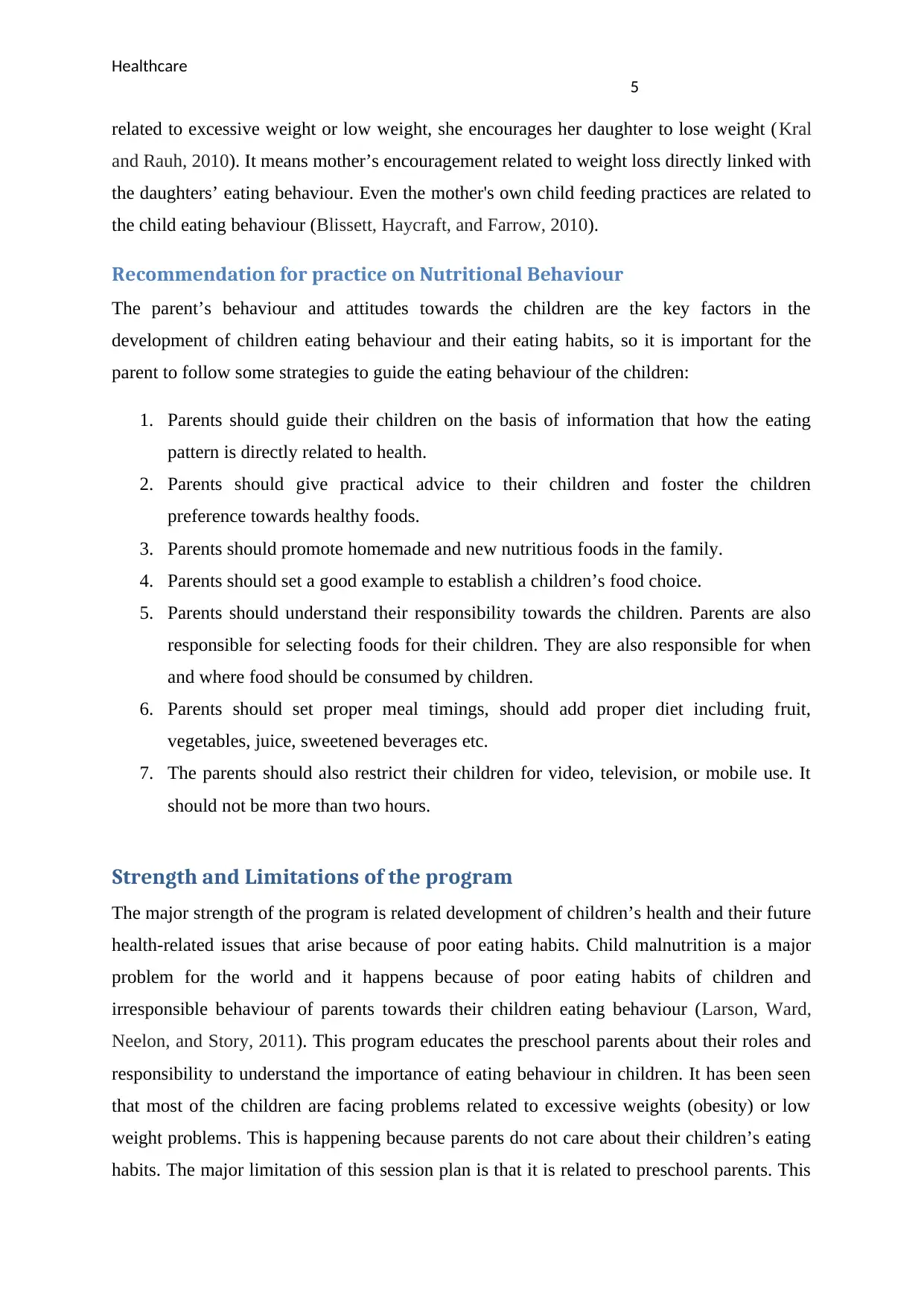
Healthcare
5
related to excessive weight or low weight, she encourages her daughter to lose weight (Kral
and Rauh, 2010). It means mother’s encouragement related to weight loss directly linked with
the daughters’ eating behaviour. Even the mother's own child feeding practices are related to
the child eating behaviour (Blissett, Haycraft, and Farrow, 2010).
Recommendation for practice on Nutritional Behaviour
The parent’s behaviour and attitudes towards the children are the key factors in the
development of children eating behaviour and their eating habits, so it is important for the
parent to follow some strategies to guide the eating behaviour of the children:
1. Parents should guide their children on the basis of information that how the eating
pattern is directly related to health.
2. Parents should give practical advice to their children and foster the children
preference towards healthy foods.
3. Parents should promote homemade and new nutritious foods in the family.
4. Parents should set a good example to establish a children’s food choice.
5. Parents should understand their responsibility towards the children. Parents are also
responsible for selecting foods for their children. They are also responsible for when
and where food should be consumed by children.
6. Parents should set proper meal timings, should add proper diet including fruit,
vegetables, juice, sweetened beverages etc.
7. The parents should also restrict their children for video, television, or mobile use. It
should not be more than two hours.
Strength and Limitations of the program
The major strength of the program is related development of children’s health and their future
health-related issues that arise because of poor eating habits. Child malnutrition is a major
problem for the world and it happens because of poor eating habits of children and
irresponsible behaviour of parents towards their children eating behaviour (Larson, Ward,
Neelon, and Story, 2011). This program educates the preschool parents about their roles and
responsibility to understand the importance of eating behaviour in children. It has been seen
that most of the children are facing problems related to excessive weights (obesity) or low
weight problems. This is happening because parents do not care about their children’s eating
habits. The major limitation of this session plan is that it is related to preschool parents. This
5
related to excessive weight or low weight, she encourages her daughter to lose weight (Kral
and Rauh, 2010). It means mother’s encouragement related to weight loss directly linked with
the daughters’ eating behaviour. Even the mother's own child feeding practices are related to
the child eating behaviour (Blissett, Haycraft, and Farrow, 2010).
Recommendation for practice on Nutritional Behaviour
The parent’s behaviour and attitudes towards the children are the key factors in the
development of children eating behaviour and their eating habits, so it is important for the
parent to follow some strategies to guide the eating behaviour of the children:
1. Parents should guide their children on the basis of information that how the eating
pattern is directly related to health.
2. Parents should give practical advice to their children and foster the children
preference towards healthy foods.
3. Parents should promote homemade and new nutritious foods in the family.
4. Parents should set a good example to establish a children’s food choice.
5. Parents should understand their responsibility towards the children. Parents are also
responsible for selecting foods for their children. They are also responsible for when
and where food should be consumed by children.
6. Parents should set proper meal timings, should add proper diet including fruit,
vegetables, juice, sweetened beverages etc.
7. The parents should also restrict their children for video, television, or mobile use. It
should not be more than two hours.
Strength and Limitations of the program
The major strength of the program is related development of children’s health and their future
health-related issues that arise because of poor eating habits. Child malnutrition is a major
problem for the world and it happens because of poor eating habits of children and
irresponsible behaviour of parents towards their children eating behaviour (Larson, Ward,
Neelon, and Story, 2011). This program educates the preschool parents about their roles and
responsibility to understand the importance of eating behaviour in children. It has been seen
that most of the children are facing problems related to excessive weights (obesity) or low
weight problems. This is happening because parents do not care about their children’s eating
habits. The major limitation of this session plan is that it is related to preschool parents. This
⊘ This is a preview!⊘
Do you want full access?
Subscribe today to unlock all pages.

Trusted by 1+ million students worldwide
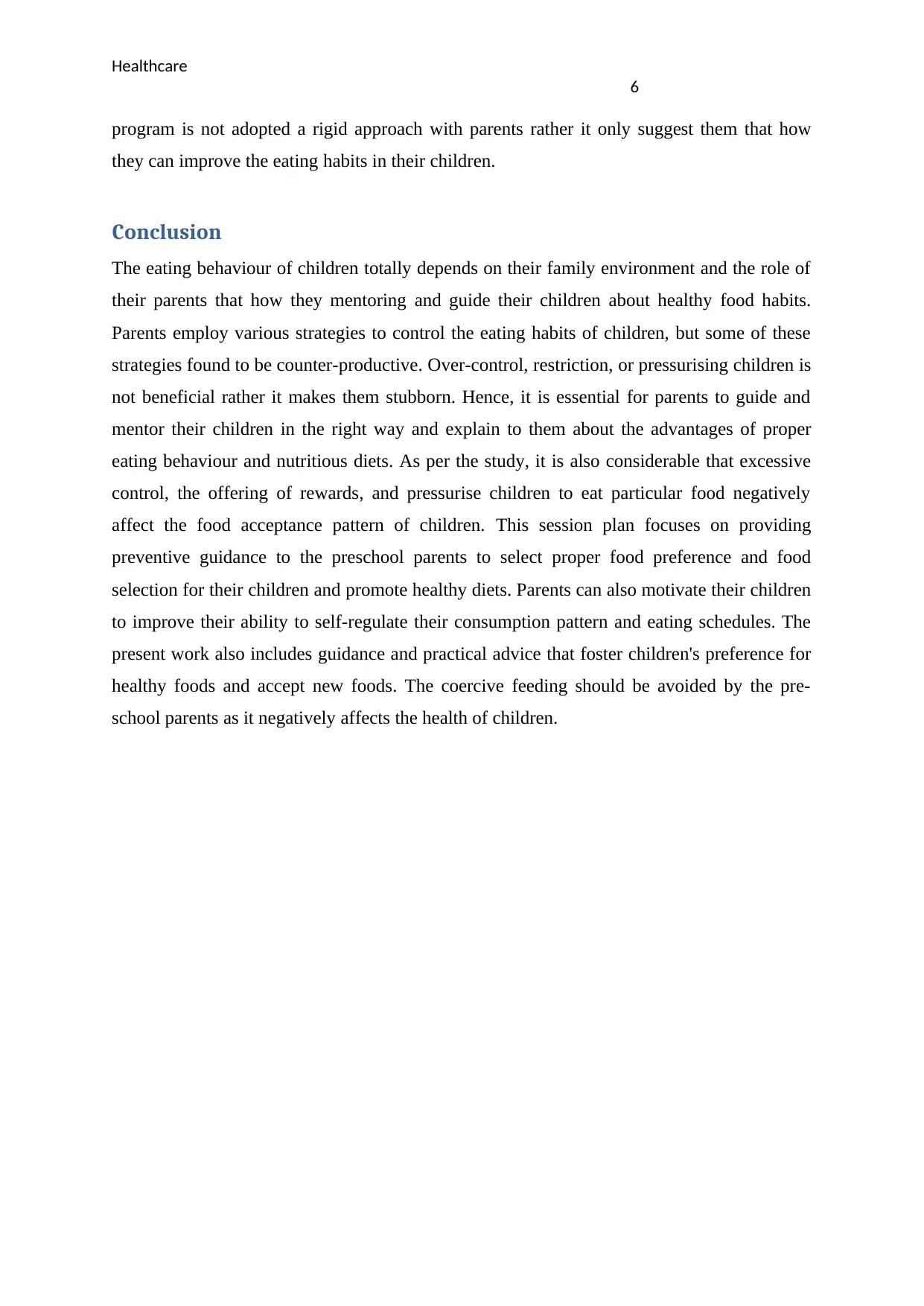
Healthcare
6
program is not adopted a rigid approach with parents rather it only suggest them that how
they can improve the eating habits in their children.
Conclusion
The eating behaviour of children totally depends on their family environment and the role of
their parents that how they mentoring and guide their children about healthy food habits.
Parents employ various strategies to control the eating habits of children, but some of these
strategies found to be counter-productive. Over-control, restriction, or pressurising children is
not beneficial rather it makes them stubborn. Hence, it is essential for parents to guide and
mentor their children in the right way and explain to them about the advantages of proper
eating behaviour and nutritious diets. As per the study, it is also considerable that excessive
control, the offering of rewards, and pressurise children to eat particular food negatively
affect the food acceptance pattern of children. This session plan focuses on providing
preventive guidance to the preschool parents to select proper food preference and food
selection for their children and promote healthy diets. Parents can also motivate their children
to improve their ability to self-regulate their consumption pattern and eating schedules. The
present work also includes guidance and practical advice that foster children's preference for
healthy foods and accept new foods. The coercive feeding should be avoided by the pre-
school parents as it negatively affects the health of children.
6
program is not adopted a rigid approach with parents rather it only suggest them that how
they can improve the eating habits in their children.
Conclusion
The eating behaviour of children totally depends on their family environment and the role of
their parents that how they mentoring and guide their children about healthy food habits.
Parents employ various strategies to control the eating habits of children, but some of these
strategies found to be counter-productive. Over-control, restriction, or pressurising children is
not beneficial rather it makes them stubborn. Hence, it is essential for parents to guide and
mentor their children in the right way and explain to them about the advantages of proper
eating behaviour and nutritious diets. As per the study, it is also considerable that excessive
control, the offering of rewards, and pressurise children to eat particular food negatively
affect the food acceptance pattern of children. This session plan focuses on providing
preventive guidance to the preschool parents to select proper food preference and food
selection for their children and promote healthy diets. Parents can also motivate their children
to improve their ability to self-regulate their consumption pattern and eating schedules. The
present work also includes guidance and practical advice that foster children's preference for
healthy foods and accept new foods. The coercive feeding should be avoided by the pre-
school parents as it negatively affects the health of children.
Paraphrase This Document
Need a fresh take? Get an instant paraphrase of this document with our AI Paraphraser
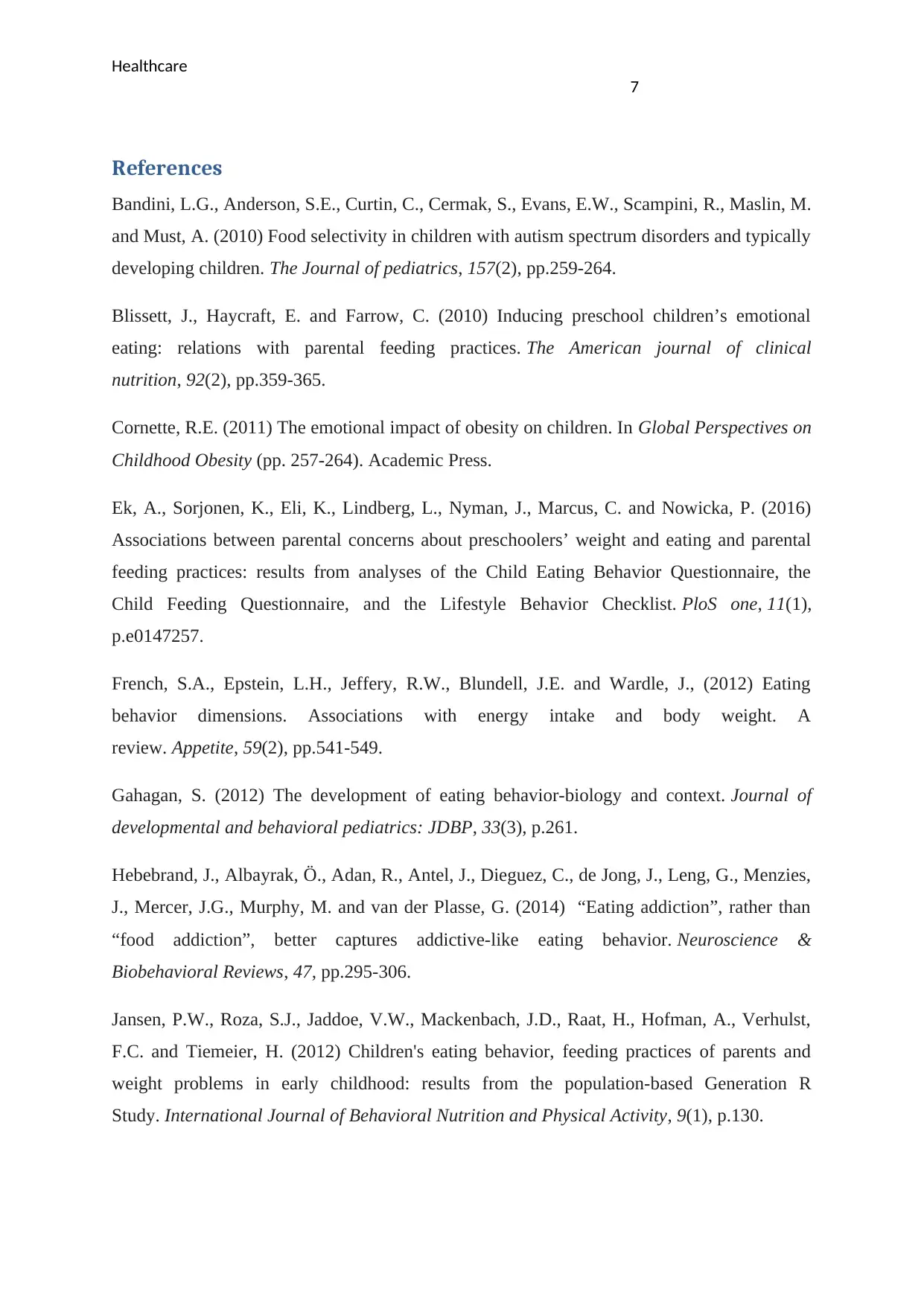
Healthcare
7
References
Bandini, L.G., Anderson, S.E., Curtin, C., Cermak, S., Evans, E.W., Scampini, R., Maslin, M.
and Must, A. (2010) Food selectivity in children with autism spectrum disorders and typically
developing children. The Journal of pediatrics, 157(2), pp.259-264.
Blissett, J., Haycraft, E. and Farrow, C. (2010) Inducing preschool children’s emotional
eating: relations with parental feeding practices. The American journal of clinical
nutrition, 92(2), pp.359-365.
Cornette, R.E. (2011) The emotional impact of obesity on children. In Global Perspectives on
Childhood Obesity (pp. 257-264). Academic Press.
Ek, A., Sorjonen, K., Eli, K., Lindberg, L., Nyman, J., Marcus, C. and Nowicka, P. (2016)
Associations between parental concerns about preschoolers’ weight and eating and parental
feeding practices: results from analyses of the Child Eating Behavior Questionnaire, the
Child Feeding Questionnaire, and the Lifestyle Behavior Checklist. PloS one, 11(1),
p.e0147257.
French, S.A., Epstein, L.H., Jeffery, R.W., Blundell, J.E. and Wardle, J., (2012) Eating
behavior dimensions. Associations with energy intake and body weight. A
review. Appetite, 59(2), pp.541-549.
Gahagan, S. (2012) The development of eating behavior-biology and context. Journal of
developmental and behavioral pediatrics: JDBP, 33(3), p.261.
Hebebrand, J., Albayrak, Ö., Adan, R., Antel, J., Dieguez, C., de Jong, J., Leng, G., Menzies,
J., Mercer, J.G., Murphy, M. and van der Plasse, G. (2014) “Eating addiction”, rather than
“food addiction”, better captures addictive-like eating behavior. Neuroscience &
Biobehavioral Reviews, 47, pp.295-306.
Jansen, P.W., Roza, S.J., Jaddoe, V.W., Mackenbach, J.D., Raat, H., Hofman, A., Verhulst,
F.C. and Tiemeier, H. (2012) Children's eating behavior, feeding practices of parents and
weight problems in early childhood: results from the population-based Generation R
Study. International Journal of Behavioral Nutrition and Physical Activity, 9(1), p.130.
7
References
Bandini, L.G., Anderson, S.E., Curtin, C., Cermak, S., Evans, E.W., Scampini, R., Maslin, M.
and Must, A. (2010) Food selectivity in children with autism spectrum disorders and typically
developing children. The Journal of pediatrics, 157(2), pp.259-264.
Blissett, J., Haycraft, E. and Farrow, C. (2010) Inducing preschool children’s emotional
eating: relations with parental feeding practices. The American journal of clinical
nutrition, 92(2), pp.359-365.
Cornette, R.E. (2011) The emotional impact of obesity on children. In Global Perspectives on
Childhood Obesity (pp. 257-264). Academic Press.
Ek, A., Sorjonen, K., Eli, K., Lindberg, L., Nyman, J., Marcus, C. and Nowicka, P. (2016)
Associations between parental concerns about preschoolers’ weight and eating and parental
feeding practices: results from analyses of the Child Eating Behavior Questionnaire, the
Child Feeding Questionnaire, and the Lifestyle Behavior Checklist. PloS one, 11(1),
p.e0147257.
French, S.A., Epstein, L.H., Jeffery, R.W., Blundell, J.E. and Wardle, J., (2012) Eating
behavior dimensions. Associations with energy intake and body weight. A
review. Appetite, 59(2), pp.541-549.
Gahagan, S. (2012) The development of eating behavior-biology and context. Journal of
developmental and behavioral pediatrics: JDBP, 33(3), p.261.
Hebebrand, J., Albayrak, Ö., Adan, R., Antel, J., Dieguez, C., de Jong, J., Leng, G., Menzies,
J., Mercer, J.G., Murphy, M. and van der Plasse, G. (2014) “Eating addiction”, rather than
“food addiction”, better captures addictive-like eating behavior. Neuroscience &
Biobehavioral Reviews, 47, pp.295-306.
Jansen, P.W., Roza, S.J., Jaddoe, V.W., Mackenbach, J.D., Raat, H., Hofman, A., Verhulst,
F.C. and Tiemeier, H. (2012) Children's eating behavior, feeding practices of parents and
weight problems in early childhood: results from the population-based Generation R
Study. International Journal of Behavioral Nutrition and Physical Activity, 9(1), p.130.
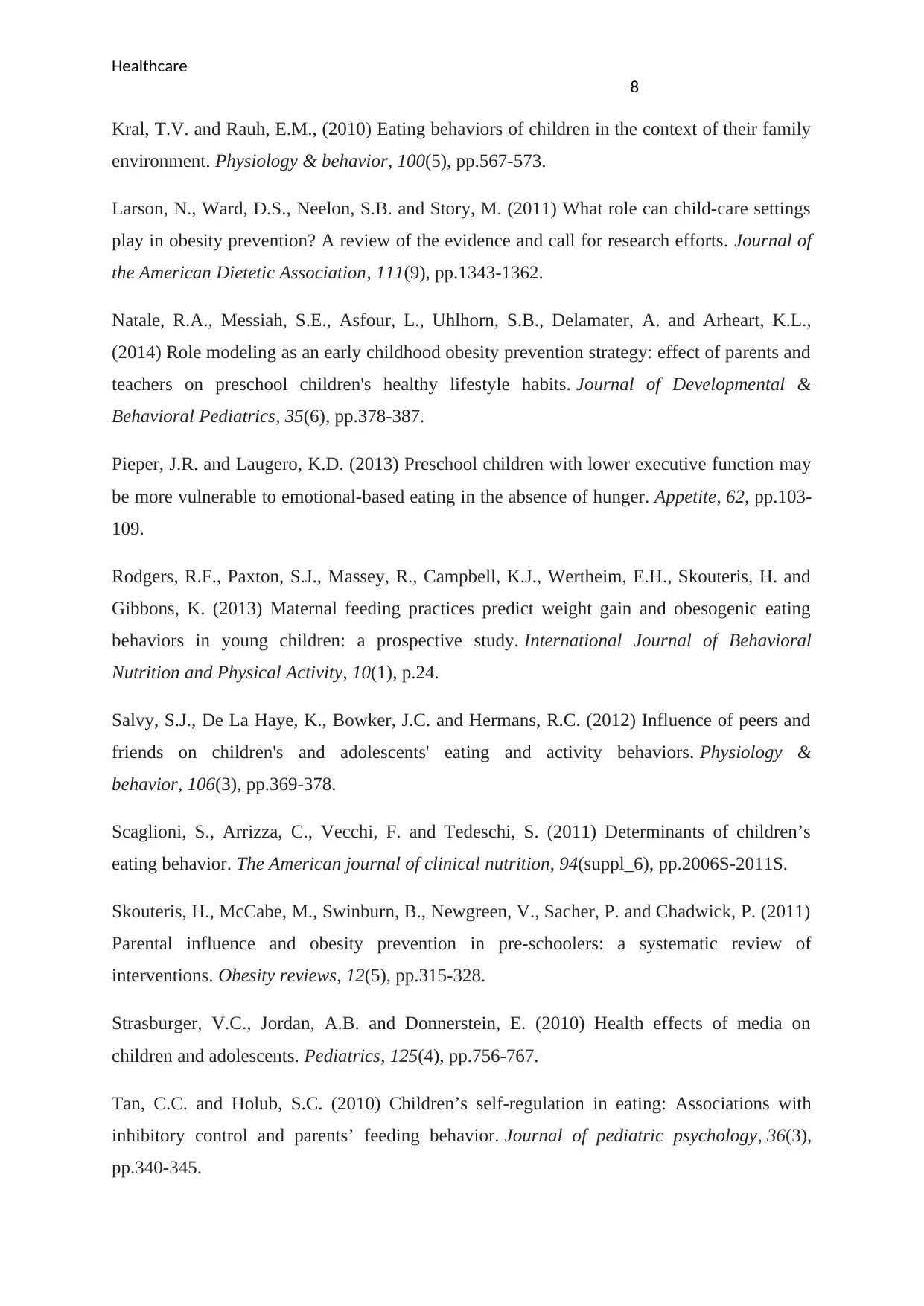
Healthcare
8
Kral, T.V. and Rauh, E.M., (2010) Eating behaviors of children in the context of their family
environment. Physiology & behavior, 100(5), pp.567-573.
Larson, N., Ward, D.S., Neelon, S.B. and Story, M. (2011) What role can child-care settings
play in obesity prevention? A review of the evidence and call for research efforts. Journal of
the American Dietetic Association, 111(9), pp.1343-1362.
Natale, R.A., Messiah, S.E., Asfour, L., Uhlhorn, S.B., Delamater, A. and Arheart, K.L.,
(2014) Role modeling as an early childhood obesity prevention strategy: effect of parents and
teachers on preschool children's healthy lifestyle habits. Journal of Developmental &
Behavioral Pediatrics, 35(6), pp.378-387.
Pieper, J.R. and Laugero, K.D. (2013) Preschool children with lower executive function may
be more vulnerable to emotional-based eating in the absence of hunger. Appetite, 62, pp.103-
109.
Rodgers, R.F., Paxton, S.J., Massey, R., Campbell, K.J., Wertheim, E.H., Skouteris, H. and
Gibbons, K. (2013) Maternal feeding practices predict weight gain and obesogenic eating
behaviors in young children: a prospective study. International Journal of Behavioral
Nutrition and Physical Activity, 10(1), p.24.
Salvy, S.J., De La Haye, K., Bowker, J.C. and Hermans, R.C. (2012) Influence of peers and
friends on children's and adolescents' eating and activity behaviors. Physiology &
behavior, 106(3), pp.369-378.
Scaglioni, S., Arrizza, C., Vecchi, F. and Tedeschi, S. (2011) Determinants of children’s
eating behavior. The American journal of clinical nutrition, 94(suppl_6), pp.2006S-2011S.
Skouteris, H., McCabe, M., Swinburn, B., Newgreen, V., Sacher, P. and Chadwick, P. (2011)
Parental influence and obesity prevention in pre‐schoolers: a systematic review of
interventions. Obesity reviews, 12(5), pp.315-328.
Strasburger, V.C., Jordan, A.B. and Donnerstein, E. (2010) Health effects of media on
children and adolescents. Pediatrics, 125(4), pp.756-767.
Tan, C.C. and Holub, S.C. (2010) Children’s self-regulation in eating: Associations with
inhibitory control and parents’ feeding behavior. Journal of pediatric psychology, 36(3),
pp.340-345.
8
Kral, T.V. and Rauh, E.M., (2010) Eating behaviors of children in the context of their family
environment. Physiology & behavior, 100(5), pp.567-573.
Larson, N., Ward, D.S., Neelon, S.B. and Story, M. (2011) What role can child-care settings
play in obesity prevention? A review of the evidence and call for research efforts. Journal of
the American Dietetic Association, 111(9), pp.1343-1362.
Natale, R.A., Messiah, S.E., Asfour, L., Uhlhorn, S.B., Delamater, A. and Arheart, K.L.,
(2014) Role modeling as an early childhood obesity prevention strategy: effect of parents and
teachers on preschool children's healthy lifestyle habits. Journal of Developmental &
Behavioral Pediatrics, 35(6), pp.378-387.
Pieper, J.R. and Laugero, K.D. (2013) Preschool children with lower executive function may
be more vulnerable to emotional-based eating in the absence of hunger. Appetite, 62, pp.103-
109.
Rodgers, R.F., Paxton, S.J., Massey, R., Campbell, K.J., Wertheim, E.H., Skouteris, H. and
Gibbons, K. (2013) Maternal feeding practices predict weight gain and obesogenic eating
behaviors in young children: a prospective study. International Journal of Behavioral
Nutrition and Physical Activity, 10(1), p.24.
Salvy, S.J., De La Haye, K., Bowker, J.C. and Hermans, R.C. (2012) Influence of peers and
friends on children's and adolescents' eating and activity behaviors. Physiology &
behavior, 106(3), pp.369-378.
Scaglioni, S., Arrizza, C., Vecchi, F. and Tedeschi, S. (2011) Determinants of children’s
eating behavior. The American journal of clinical nutrition, 94(suppl_6), pp.2006S-2011S.
Skouteris, H., McCabe, M., Swinburn, B., Newgreen, V., Sacher, P. and Chadwick, P. (2011)
Parental influence and obesity prevention in pre‐schoolers: a systematic review of
interventions. Obesity reviews, 12(5), pp.315-328.
Strasburger, V.C., Jordan, A.B. and Donnerstein, E. (2010) Health effects of media on
children and adolescents. Pediatrics, 125(4), pp.756-767.
Tan, C.C. and Holub, S.C. (2010) Children’s self-regulation in eating: Associations with
inhibitory control and parents’ feeding behavior. Journal of pediatric psychology, 36(3),
pp.340-345.
⊘ This is a preview!⊘
Do you want full access?
Subscribe today to unlock all pages.

Trusted by 1+ million students worldwide
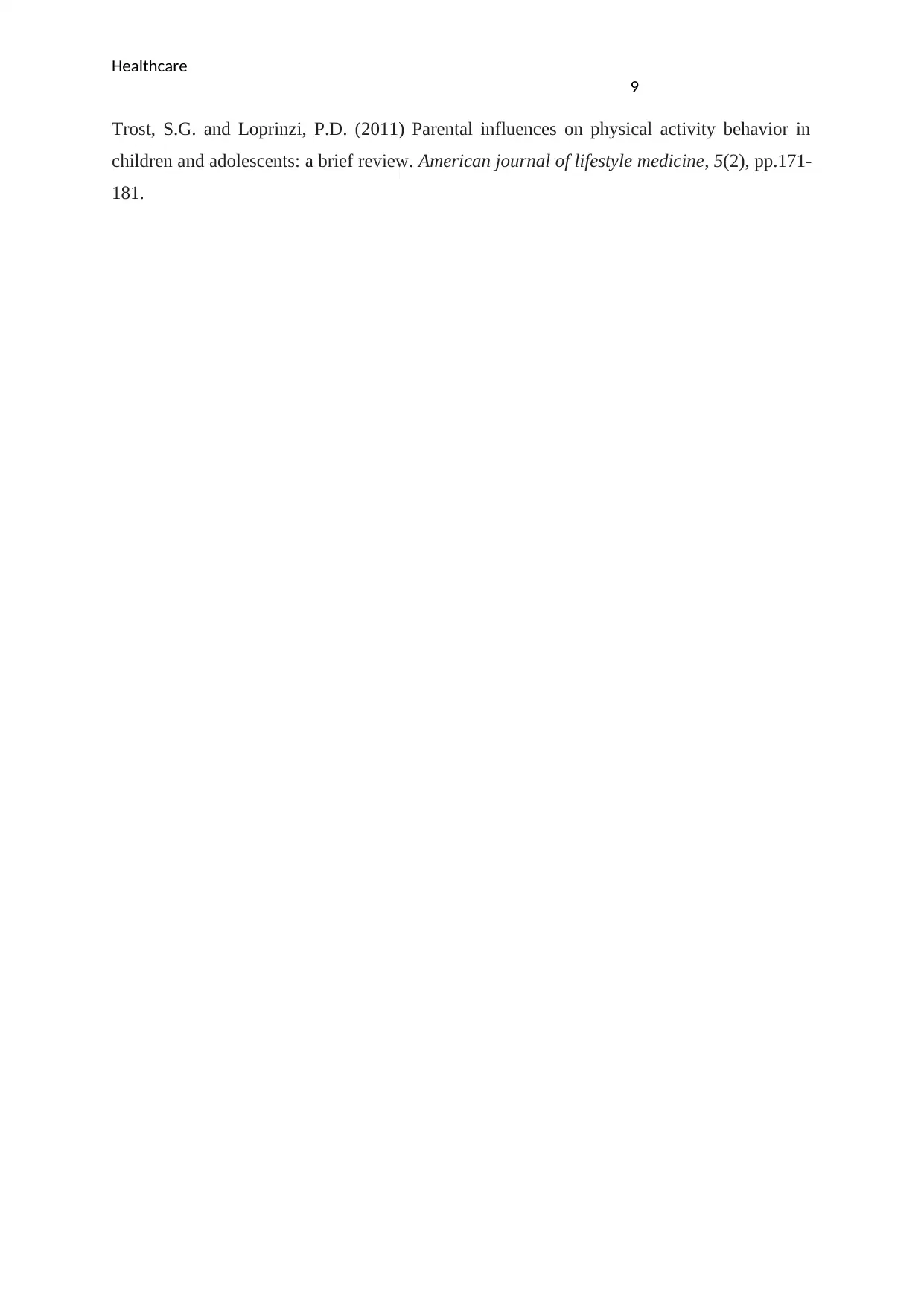
Healthcare
9
Trost, S.G. and Loprinzi, P.D. (2011) Parental influences on physical activity behavior in
children and adolescents: a brief review. American journal of lifestyle medicine, 5(2), pp.171-
181.
9
Trost, S.G. and Loprinzi, P.D. (2011) Parental influences on physical activity behavior in
children and adolescents: a brief review. American journal of lifestyle medicine, 5(2), pp.171-
181.
1 out of 10
Related Documents
Your All-in-One AI-Powered Toolkit for Academic Success.
+13062052269
info@desklib.com
Available 24*7 on WhatsApp / Email
![[object Object]](/_next/static/media/star-bottom.7253800d.svg)
Unlock your academic potential
Copyright © 2020–2026 A2Z Services. All Rights Reserved. Developed and managed by ZUCOL.





